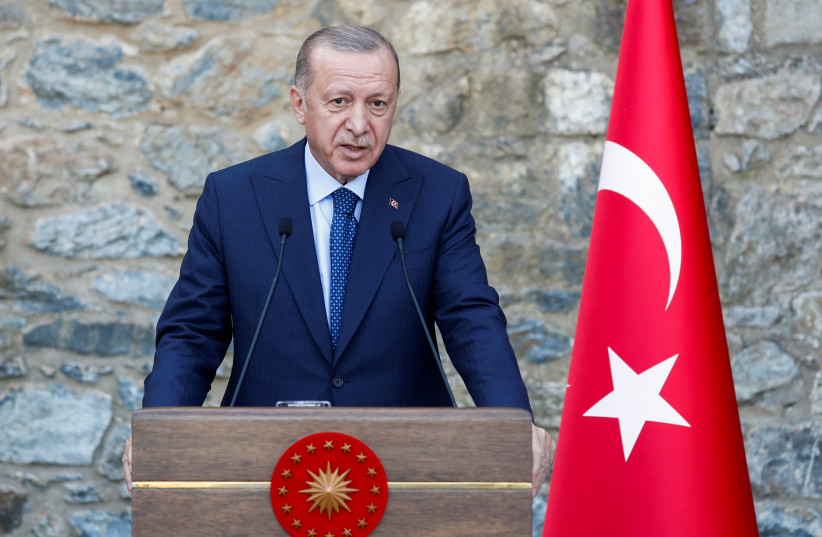If Turkey really is a potential partner with Israel against Iran, how come Turkey adores Iran’s leadership and never opposes Iran?

Israel-Turkey relations have been reduced to their worst point in history over the last decade because of the actions of Turkey’s leader and the ruling party.
With its roots in the Muslim Brotherhood and support for Hamas, the AK Party and its leader Recep Tayyip Erdogan is a reactionary far-right religious party that has sought to transform Turkey into an authoritarian one-party state, while backing extremist groups in places like Syria. It has sought to take on an “Islamic” leadership role, not only backing Islamist groups but also championing “Islamic” causes. As part of this, the Palestinians loom large and support for Hamas is part of that cause.
However, despite Turkey’s obsessive anti-Israel policies, such as comparing Israel to Nazi-era Germany and hosting top-level Hamas terrorists who plotted attacks on Israel from Turkey, there has been a constant lobby to restore Turkey-Israel relations. This lobby is primarily made up of some pro-Israel voices, think tanks and a spectrum that stretches from the Left to Right. It is rooted usually in memories of the 1990s when Israeli parties on the Left and Right both held power and had positive relations with Turkey.
Supporters of reconciliation between Israel and Turkey don’t acknowledge that it is Turkey that primarily burned down the relationship due entirely to the ideology of the current regime in Ankara. Instead, the supporters posit that Israel and Turkey enjoy some strategic and economic interests and that they are somehow destined to work together.
This “geopolitical” destiny harkens back to the Cold War era, and supporters of Turkey are almost all people with worldviews rooted in the Cold war or 1990s era. For them Turkey is not a country made up of the ideological roots of the parties that run it, it is not a changing society with different views among its people, it is a “strategic” entity. It transcends politics and the current leader, and because of its position, between Europe and the Middle East, it is destined to clash with Iran and destined to be a conduit for Israeli economic needs.
This worldview, which posits that whether Turkey is run by ideological allies of the Taliban or Communists is immaterial; that Turkey hosts actual Hamas terrorists who plot to murder Israelis, is not a problem. That Turkey threatened to break off relations with the UAE to try to stop the UAE making peace with Israel, is not a problem. That Turkey sent hundreds of men armed with melee weapons on the Mavi Marmara to try to infiltrate Gaza by sea, is not a problem. That Turkey’s leader has often compared Israel to the Nazis, is not an issue. For the reconciliation narrative, all this is just rhetoric. What matters is strategy.
The latest “reconciliation” talk began, as it usually does, in Ankara. Ankara has floated reconciliation in the past, usually as a way to try to sabotage Israel’s relations with Greece and isolate Israel. Reconciliation is a tool for Ankara to gain things it wants. For instance, it sought to send an envoy to Israel that was openly anti-Zionist. That was “reconciliation.” It also wants to prevent an Israel-Greece pipeline and energy deals. It also wants its economy to improve and also wants better relations with the US. Turkey’s leadership has plunged the country into economic disaster and inflation increases. Ankara thinks that Israel can be an economic lifeline.
In every “reconciliation” story there is nothing that Israel gets from better ties with Ankara.
In the recent bout of “reconciliation” talk from Ankara, Erdogan announced that Israel’s president would visit Turkey. He didn’t coordinate this announcement with Israel and purposely sought to force Israel’s hand in this matter. It turns out that Israel’s president is about to visit the UAE, so Turkey sought to upstage that visit. This is not the announcement of a friend, to go against protocol and try to force Israel’s president into a visit. The goal of Ankara was clear: Force Israel to either confirm or deny the visit. Turkey often abuses Israel to get things it wants. Last year Turkey detained an Israeli tourist couple for no reason. This was said to be part of how Turkey wants “reconciliation.” The idea is that if Israel doesn’t do what Turkey wants, then more Israelis might be detained or disappeared. Reconciliation is always achieved through threats by Ankara.
Those who back reconciliation tend to argue that there are economic benefits for Israel. There is little evidence of this. Israel’s economy has performed well over the last decades. Israel already has trade with Turkey. It is Turkey’s economy that is in free-fall and it’s unclear why Israel would want exposure to this economic shambles. Closer economic ties with the Gulf and stable Asian countries would appear more productive.
Another argument is that Turkey somehow agrees with Israel on Iran issues and Syria. This theory asserts that Turkey is a natural rival of Iran. This is because people think that Turkey is a “Sunni” country and thus destined to fight the “Shia” in Iran. Also because some argue that the Ottomans are historic rivals of the “Persians.” Thus these countries must always fight each other. Surely some misreadings of European history would have one posited that Catholic and Protestant countries will always war, and that France and Britain are bitter rivals. But history tells us that simplistic stories about how countries have to be “geopolitical” rivals is largely a myth based on bad academic studies in the West. The same logic guides the US to work closely with China “against” Russia for decades, only to find out that China and Russia both oppose the US “geopolitically” in the world.
There is no evidence of Turkey and Iran clashing. In the opposite, while Turkey’s regime was destroying relations with Israel over the last decade, it was growing closer to Iran. While Israeli ambassadors were sent packing in Ankara and there were no high-level visits, Turkey’s leadership often hosted its Iranian friends. Meanwhile at think tanks in the US and Israel experts continued to argue that Turkey would work with Israel against Iran. If Ankara wanted to work against Iran in Syria or the region, it would have done this over the last decade. Instead, Turkey devotes its resources to using drones to attack Kurds and Yazidis in Iraq and Syria, and encouraged war between Azerbaijan and Armenia, and threatens Greece. Turkey basically fights everyone, except Iran.
At each juncture the question should be raised, if Turkey really is a potential partner with Israel against Iran, how come Turkey adores Iran’s leadership and never opposes Iran, and compares Israel to the Nazis? The idea is that Israel should “reconcile” with Turkey, which is the country that ruined the relationship, with the hope that in years and year maybe Turkey will want to do something regarding Iran? This is based on the fantasy that Turkey’s leadership doesn’t make its own decisions, but can be somehow influenced by Israel. Yet the leadership in Ankara has made its decisions clear. It has ample opportunity to remove Hamas, confront Iran, or put out positive messages about Israel.
Announcing Israeli presidential visits without coordination isn’t a sign of respect for Israel, it’s just another way to try to muddle Israel-UAE relations. At every step, Turkey has no interest in doing anything that Israel wants. And yet the “reconciliation” narrative continues.
Content retrieved from: https://www.jpost.com/middle-east/article-694967.
